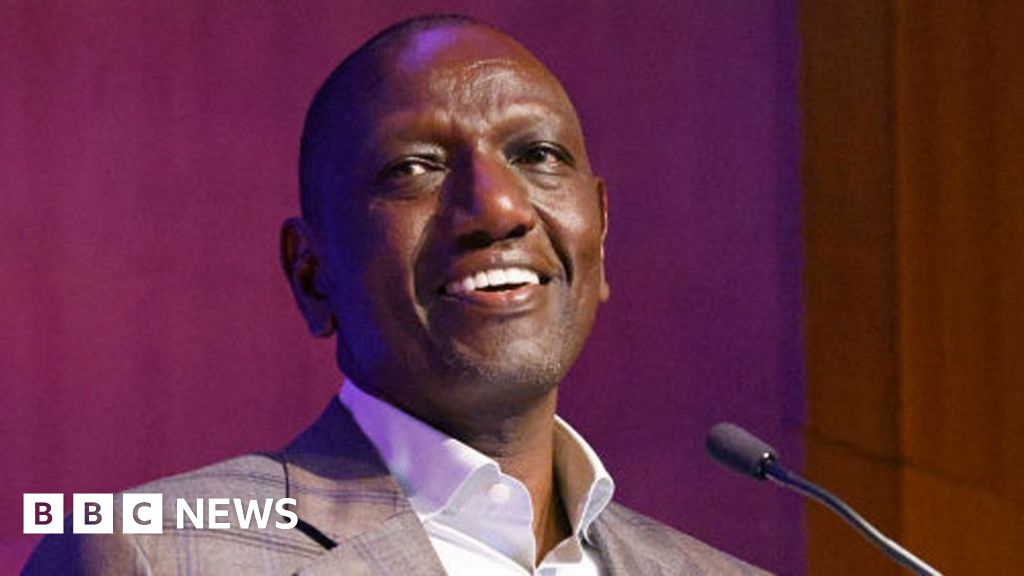Barbara Platt Usher,BBC News Africa Correspondent, Nairobi
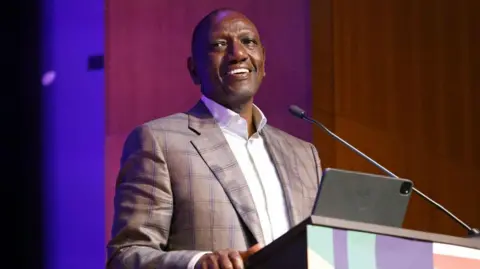 Getty Images
Getty ImagesKenyan President William Ruto will become the first African leader to pay an official state visit to the United States in 15 years.
It’s an opportunity for President Joe Biden to demonstrate his commitment to Africa at a time when Washington appears to be catching up on engagement with the continent.
But relations with other African allies are facing strains as strategic rivals such as Russia and China challenge traditional areas of Western influence.
There was a time when Mr Ruto was unlikely to receive a grand welcome at the White House, as only a handful of close allies enjoyed such pomp and ceremony during the year.
The International Criminal Court charged him with crimes against humanity related to post-election violence in Kenya in 2007. But the case died, and Mr. Ruto has since recast himself as an indispensable partner of the United States.
U.S. Ambassador to Kenya Meg Whitman said continued doubts about his democratic credentials were not the reason for Congress’ decision not to invite him to address the joint session. As far as she knew, it was a scheduling issue.
Ms. Whitman, a former chief executive of companies including eBay and Hewlett Packard Enterprise, is a champion of Kenya and its investment potential as a technology hub, known as the Silicon Valley Savannah.
“If you really want to go to Africa, who is the right person to attend the state banquet?” she asked.
“Kenya has been a long-standing ally of the United States for 60 years. It is undoubtedly the most stable democracy in East Africa. President Ruto has stepped up and he is a true leader.
Under Mr. Ruto, Kenya has developed into a diplomatic and commercial hub in the region and an “anchor country” for the United States among its tense neighbors.
While at home he has faced protests over his handling of the struggling economy, globally he has become an advocate for issues related to climate change and debt relief in Africa.
Kenya is also an important security partner in East Africa and has delighted Washington by pledging to send Kenyan police to Haiti.
President Biden’s only call to sub-Saharan African leaders last year was to Mr Ruto, with Nairobi pledging to lead a multinational force to the troubled country.
Analysts suspect the state visit is in part an effort to make up for Biden’s failure to fulfill his promise to visit Africa.
He made the pledge at a grand summit of African leaders in Washington two years ago, assuring guests that he would be “all in” to support the continent. But since then, his attention has been drawn to crises elsewhere, such as the wars in Ukraine and Gaza.
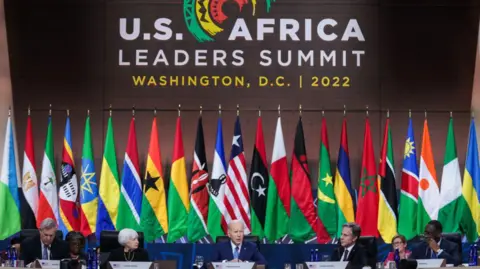 Getty Images
Getty ImagesAhead of the summit, the government announced a new strategy aimed at transforming its relationship with African countries into a more equal partnership to advance the strategic interests of both parties.
In some ways, Mr. Ruto is the poster boy for this approach, but when he arrived in Washington, the focus had been on U.S. setbacks in West Africa.
If there is one country that best embodies the challenges America faces in Africa, it may be Niger.
Over the years, more than 1,000 U.S. troops have been stationed here at two bases, from where they have launched security operations against Islamist militants in the area.
But a coup last year changed the nature of the relationship – with Niger’s military rulers increasingly close to Russia and Iran.
U.S. efforts to pursue continued security cooperation failed in March.
The junta’s prime minister told The Washington Post that the senior U.S. delegation adopted a “condescending tone” and showed a “lack of respect.” He accused it of trying to dictate Niamey’s relations with other countries.
This week, the Pentagon confirmed a full troop withdrawal by September, opening the door to closer ties between Niger and Moscow.
Molly Fey, the U.S. State Department’s senior Africa affairs official, said it was impossible to reconcile U.S. interests and values with the military government, which included a timetable for a return to civilian rule.
“We have legitimate concerns about the trajectory of the economy [Niger’s] Discussions with Russia and Iran,” she told the BBC.
“Ultimately, we were unable to agree on a solution to our top priorities,” she said, noting that the relationship should be reciprocal.
“We intend to maintain our diplomatic partnership and other aspects of our relationship.”
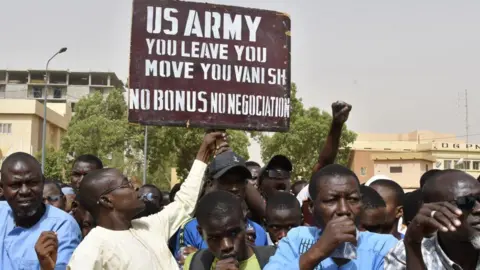 AFP
AFPNiger’s economy collapsed after it expelled France, its old colonial power.
It highlights the tensions in the United States’ attempts to balance security partnerships with democratic values, while Russia has no such constraints.
What’s happening in Niger is echoed in other Sahel countries – Moscow is happy to provide protection to those who seize power in a series of coups, often in exchange for access to natural resources.
A small number of U.S. troops have been forced to leave Niger’s neighboring Chad in recent weeks as officials there raised questions about the future of the U.S. troop presence.
The United States also faces increasing competition from other countries on the continent. China has been investing in Africa for two decades, but many new middle powers have emerged.
Last year’s Gallup poll It was discovered that the United States lost its soft power advantage while China gained fans. But the biggest change is Russia’s rise in popularity.
“Historically, the West has viewed Africa as a problem that needs to be solved. Players like China and Turkey, as well as other Arab Gulf players, see this as an opportunity worth seizing,” said Murry, Africa program director at the International Crisis Group. Muritha Mutiga said.
“So the engagement approach between China, Turkey and the Gulf is welcomed because it is seen as a long-term bet, seen as taking the continent seriously.”
The Biden administration points to some success in its efforts to treat Africa as a strategic partner.
A series of high-level visits have highlighted Africa’s importance as the “continent of the future”, with its rapidly growing young population, rich natural resources and growing influence on the international stage.
U.S. support has helped African countries win better representation in global forums such as the G20, the International Monetary Fund and the World Bank, although U.S. positions on Israel’s war in Gaza and Russia’s war with Ukraine have been difficult to gain African support.
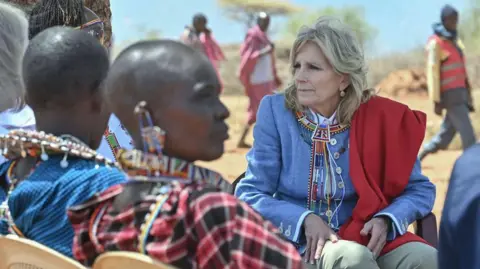 AFP
AFPThe government has also won praise for its investment in the Lobito Corridor, a railway line that snakes through Angola, the Democratic Republic of Congo and Zambia and will be used to transport critical raw materials.
“With the Lobito Corridor, [the Americans] “We decided to speak in a language that Africans understand,” said Kingsley Moghalu, a Nigerian political economist and former central bank governor.
“If people think you are implementing major projects that will benefit the African economy and African people, then on that basis you are qualified to talk about democracy and things like that.”
Alex Vines, head of the Africa program at Chatham House in London, disputes the idea that Western power is declining in Africa.
“An African leader said to me: ‘We are tired of the Chinese buffet, we want a la carte, we want choice,'” he said.
“So, I do think what we’re seeing more and more is [that] Many African countries want a little bit of American power, but they also want a little bit of Russian, Emirati, or Turkish power.
The challenge is “uneven African leadership” with an ambitious long-term vision to take advantage of competition.
President Ruto is seen as one of the capable men, but everyone, including Niger, has a choice.
“It’s a chess game,” Dr. Vines said. “There is a new scramble for Africa. The difference is that on the chessboard, the continent is alive, it is not passive. It can attract people’s attention and give them real surprises.”
You might be right too.
 Getty Images/BBC
Getty Images/BBC
